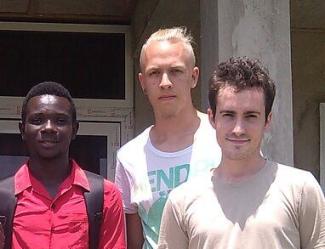weltwärts volunteers
“Our vision is to empower the youth”

Who is the target group of your work?
Children from junior high school and senior high school are our target group. They are 13 to 18 years old.
Why do they need AIM?
Well, we are running ICT courses, and the young people in Komenda have no other opportunities to acquire the skills we teach. Most Ghanaians are uneducated when it comes to ICT. Our vision is to empower the youth through education. That in itself will make Komenda a more attractive place to live, and, just as important, it will empower people to make it even more attractive. I think it’s the best way for the youth to grow. They need this kind of opportunity and do not get it elsewhere.
What is your biggest success so far?
We have actually had lot of success. In 2008, we produced an album with music. A volunteer recorded it, our youth club was involved. The album was launched by the Goethe Institute in Accra and was made available even in Germany. That was our biggest music project. Another success was to procure a huge water storage container with help from the German embassy when Komenda was facing cholera outbreak and people needed safe drinking water. Our youth club and one volunteer wrote a proposal to the German embassy. The German ambassador even came here to inaugurate the project. Another success was our movie workshop. We produced a documentary film that dealt with ecological challenges in Komenda and participated in the Environmental Film Festival in Accra. All youth club members were involved in making the documentary as well as discussions at the festival.
What was the biggest setback?
This question is not easy. We would like to have more local volunteers, but the understanding of voluntary work is different here. People must earn a living. But still, in society you need to sacrifice to achieve your aims. We need to keep convincing our local people to become and stay involved, to support our work without getting paid. It is a huge challenge.
When was AIM founded and for what reason?
The organisation was founded in 2006. The main purpose was to establish the ICT Training Centre, and we will finally open it in September this year. It will help us to run our programmes and work more effectively. The long-term goal is to keep as many members of the young generation as possible here and reduce migration to the big cities.
What obstacles do you face?
The only real issue is funding. Money is always short.
How do you finance your work?
Up to now, we basically depend on funds from AIM Germany. We have different cultures, and sometimes we have long arguments about projects. These debates slow down our work to some extent, but they also help us to understand our work better and improve our efforts.
How could you mobilise resources in your own country?
It would be good for AIM Ghana to have a business entity which will generate income for our social projects. AIM Ghana could make money by providing services to people. If AIM Ghana had a car, for example, we could take passengers from Komenda to Accra or the town of Cape Coast, and we could charge money for that service. It would be nice if AIM Germany gave us oans so we could buy a car. Another option would be to start a restaurant. These are things we are discussing with AIM Germany, and so far, we have not convinced our partners yet.
What political or social cause do you promote?
Good education is essential. There is a saying that it is a key to success. We are fighting educational inequality. It is a social injustice that only the children of upper-class people have the privilege to use computers, simply because other families cannot afford the devices. Children of the poor lack opportunities. Thanks to our work, everyone in Komenda has access to ICT training, and I am convinced that these skills will help our community solve many of the problems we are facing today.
Francis Aidoo is the project coordinator of the African Information Movement Ghana, a non-governmental organisation.
info@aim-ev.org
http://www.aim-ev.org
Leon Wilken and Lois Fontaine are weltwärts volunteers with AIM Ghana. Weltwärts is a volunteer programme funded by Germany’s Federal Ministry for Economic Cooperation and Development (BMZ) and managed by Engagement Global on its behalf.












